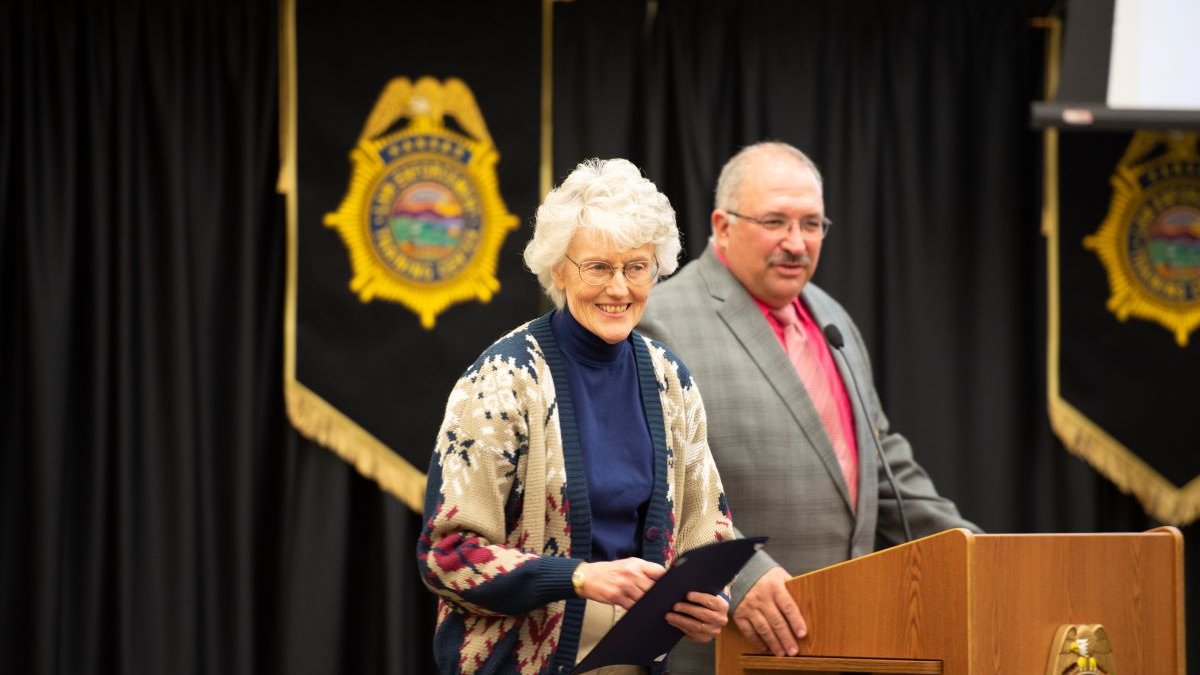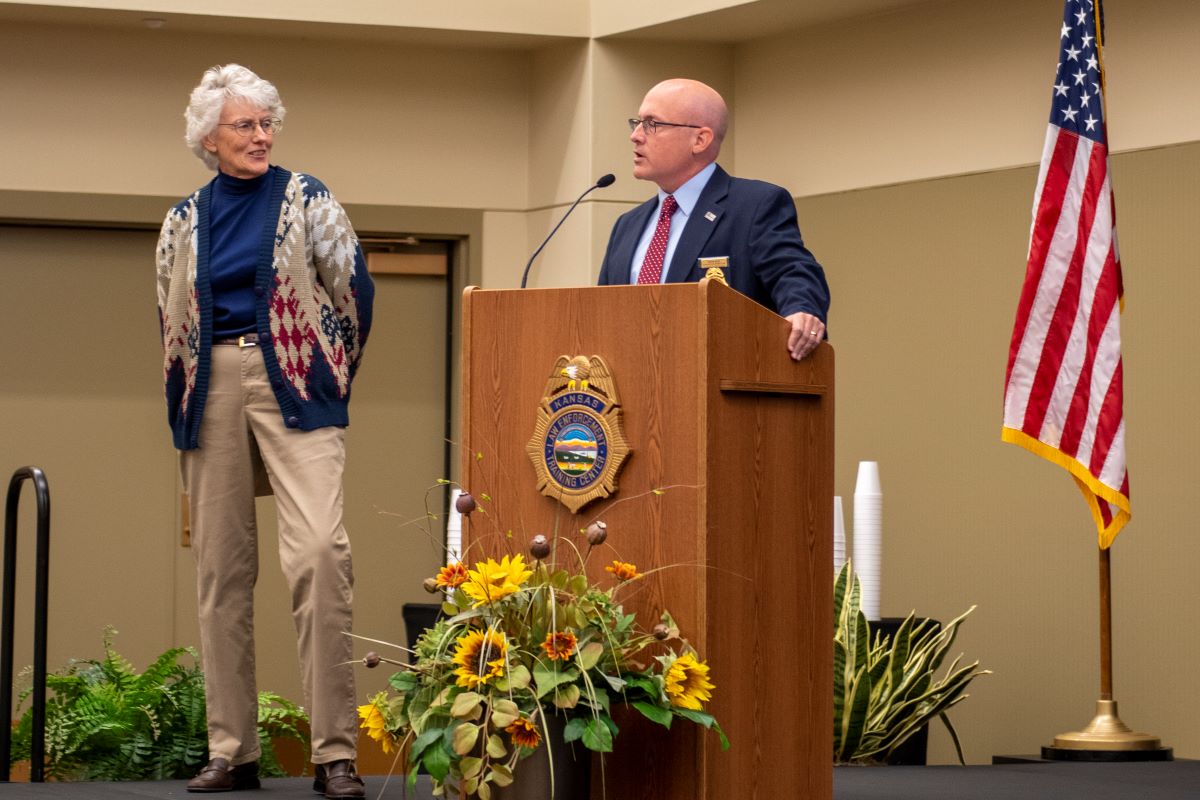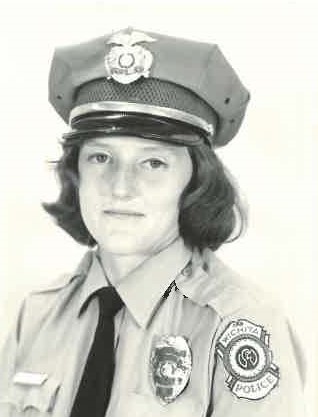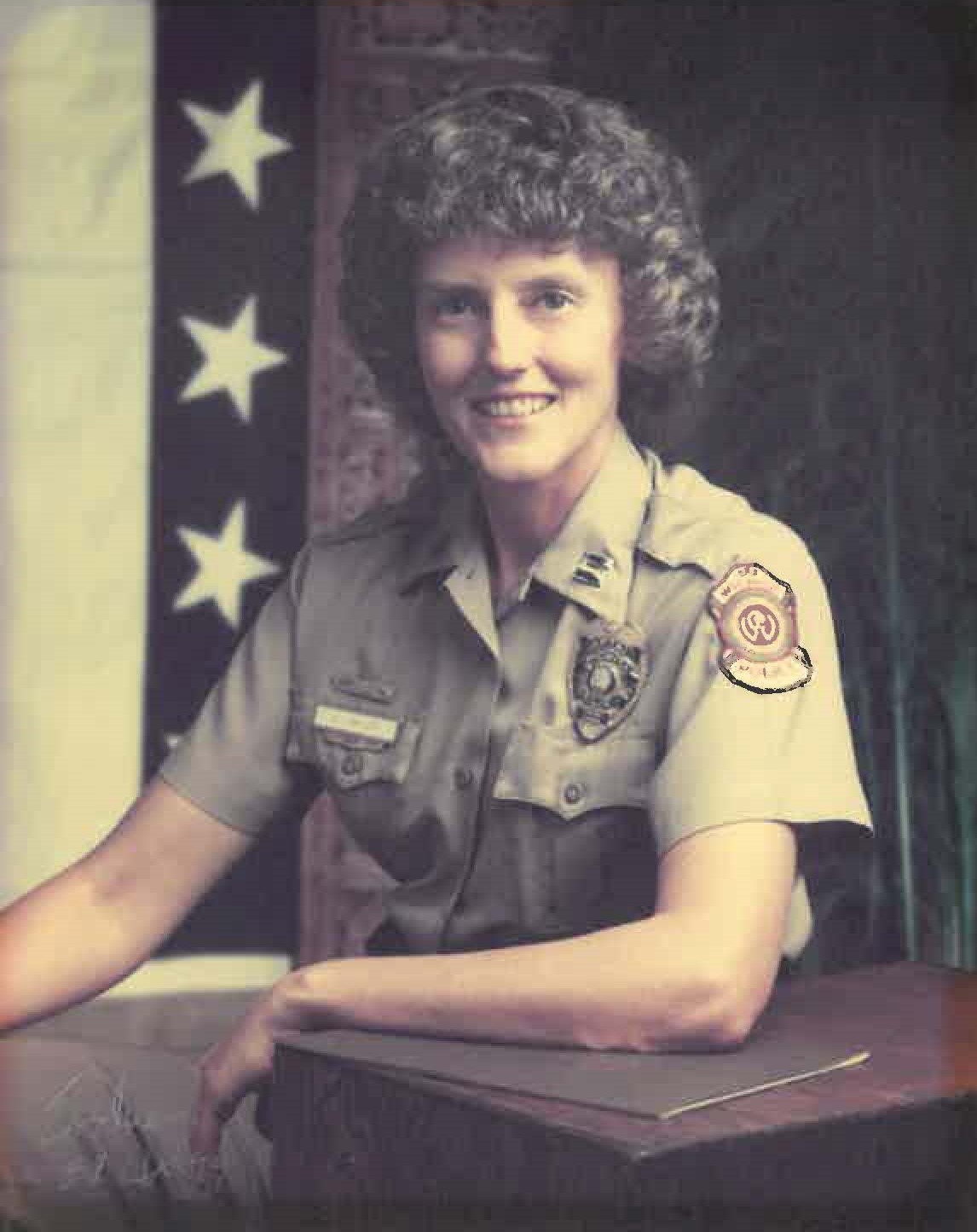Beckie Miller retires from KLETC after 42 years in law enforcement

Beckie Miller, the now former assistant director and basic training administrator at the Kansas Law Enforcement Training Center (KLETC), signed off for good during her retirement celebration on Oct. 4 (yes, that’s 10-4). On staff at KLETC for the past 21 years, Miller hung up her badge after a 42-year career in law enforcement, which saw her becoming the first female lieutenant then captain to work the streets as a commander while serving with the Wichita Police Department from 1977 to 1998 and being instrumental in training approximately 9,000 officers during her time at KLETC.
“Beckie has obviously been a tremendous role model for a generation of female law enforcement officers,” said KLETC Executive Director Darin Beck. “She has also been a mentor to many — including myself — through her unwavering dedication and commitment to integrity.”

And it’s with this integrity she has managed to build her career around serving her surrounding communities and training law enforcement officers throughout the state. In her latest role at KLETC – part of KU Professional & Continuing Education – she oversaw the full-time, part-time, and reciprocity basic training programs, curriculum and testing development, and administering the challenge exams. During her tenure, she was instrumental in 114 full-time basic training academies as well as 84 part-time academies and reciprocity training classes.
How did she land on 10-4 for her retirement? “What better way to end a career after 42 years in law enforcement,” she said. “I’ve always told my students October is my favorite because every day is a ten-code. We’ve had a lot of fun with it.”
While the meaning of 10-4 is to express acknowledgement, her career has been much more than “OK.” Here’s a Q&A session with Miller as she reflects on her decades-long career.
What led you to the Kansas Law Enforcement Training Center?
A: I was coming close to retirement after 21 years with the Wichita Police Department and was still relatively young. My last assignment there was as the director and commander of the department’s training academy. I thought it was so great to be involved in the training of new officers while still being a part of the department.
I knew of others who had moved on to KLETC, and I was very interested. It was always my plan to stay involved in law enforcement and get more involved in the training part of it. So, I waited for an opening at KLETC.
I started as an instructor of police in February 1998, 21 years and eight months ago. I’d say it was a very natural transition.
How did you become interested in law enforcement?
A: I went to Wichita to attend Wichita State University [WSU] and study accounting. I was good with math and numbers, and I’m a pretty detailed person. I got into my curriculum there – electives and some of the business and accounting courses – and soon realized that wasn’t for me.

I grew up on a farm in rural Kansas. Being cooped up in an office all day didn’t appeal to me. I spoke with some folks on campus and talked about the criminal justice department at WSU. Now that sounded interesting. I changed my major and got my degree before I applied to the Wichita Police Department.
I’m glad I found this profession. It seemed to fit like a glove, and it’s worked out pretty well, I think.
What was it like being a woman in law enforcement?
A: It was 1977 when I was in the application process in Wichita. At that time, it wasn’t uncommon to have more than 100 people on the eligibility list. There were 19 officers in my recruit class, and I was the only female. It just started off that way.
I was never really around female officers. I went through rookie school with guys, but I didn’t have too many difficulties. Most of the challenges came from supervisors who maybe didn’t look at females as equals, but my coworkers were never hesitant to back me.
Women used to be hired as detectives in the juvenile division since they were thought to work better with juveniles then the men. It wasn’t until 1972 and 1973 when women were first on the street. I had trailblazers in front of me as I got to that point.
I worked the streets as a patrol officer for six years, was then promoted to detective and worked undercover in vice and narcotics, and sex offenses before being promoted to lieutenant and then as a patrol captain. I worked the streets as a patrol lieutenant, overseeing patrol officers, and as a captain, overseeing patrol lieutenants and officers. I served as an investigation lieutenant, overseeing detectives in the night detective section, the auto theft section, and the exploited and missing child section; and as a captain, I oversaw the property crime units before transferring to the support services division.
I was the first female captain to work the streets as a commander for the Wichita Police Department, as well as in my role as lieutenant. I was pretty blessed.
What have you seen change over the years in regards to the prevalence of women in law enforcement?

A: Women are definitely more prevalent in law enforcement than they have been in the past. When I was in Wichita, I think about 6 percent of the commissioned officers were women in our organization. That stayed pretty steady until I retired.
When I came to KLETC, I was really amazed at the number of women in our training classes. Kudos to the agencies who are hiring women and identifying this as a need for their community, to have a representation of who they serve. The [252nd basic training] class was amazing, while not necessarily the norm.
It will be interesting to see how it continues.
What was the greatest accomplishment of your career?
A: It was a blessing to go to work every day and interact with the people, be it the citizens of Wichita, the WPD personnel, the student officers, the agency personnel or the KLETC staff. It was fantastic and made the job so enjoyable. It's the accomplishments of the profession as we continue to make strides in the training environment to make the job safer for all the officers.
The curriculum and testing I’ve been responsible for isn’t easy. It’s a challenging job and has become so complicated. It went from a ‘big man’s job’ to a ‘smart man’s job.’ We challenge our students like we should. We make sure they know it’s not going to be a cake walk when they get out there on the street. They have to know what they’re going to be accountable for.
What’s your favorite memory at the Kansas Law Enforcement Training Center?
A: Amazement would be a better word than favorite … the progression we’ve made. We also get amazing support from the law enforcement community throughout Kansas. I like that type of a working environment.
I don’t think I have one favorite memory, but the staff here is just outstanding. In my 21 years, it has grown so much. I came to work under the directorship of Ed Pavey. Now we have Darin Beck who has continued to push us to achieve things he thinks we’re capable of doing. It’s amazing to me, the advancement this facility has made over the years.
The student officers who have come through here go off to do amazing things. It’s been very interesting to me to get to talk to these people years later to find out they’re still in law enforcement and doing well. We’ve had students become officers, deputies, chiefs, sheriffs. There are a lot of good people out there.
This staff has passion, and that’s what it takes for this profession.
What advice do you give to women considering law enforcement today?
A: When I talk to the women, I always tell them that it’s my impression it doesn’t matter if you’re male or female. We need to look at if you’re competent for the job. That’s what we’re looking for. You just want your back up to be competent because of the situations we find ourselves in.
Take care of business, get the job done, have confidence in yourself. If you don’t know what you’re doing, then you better learn. Incompetence doesn’t make it in this profession. You’ve accepted the responsibility that comes with this job.
In Wichita, I rose to the rank of captain, and many women have after me. Carry yourself with professionalism. I’ve always prided myself on my level of professionalism and ethics, and I hold myself and others to a very high standard.
What are you looking forward to the most in retirement?
A: My husband retires two weeks after me, and we don’t have anything monumental planned. We’re looking to take six months and enjoy getting out of the rat race for a while. Next spring, we may look at some travel. When you’ve been in the hustle and bustle with the requirements of this kind of job, you don’t get to focus a lot on your home. I’m looking forward to doing that and keeping up the visits to my mom every other weekend.
I just know I left the Wichita Police Department on a Friday and started at KLETC on a Monday. I’m not doing that again.
Top photo: Beckie Miller celebrates her retirement on 10-4 from the Kansas Law Enforcement Training Center as her supervisor, Alvin Sowers, KLETC Associate Director for Basic Training, delivers remarks at her reception.
Learn more about the Kansas Law Enforcement Training Center.





